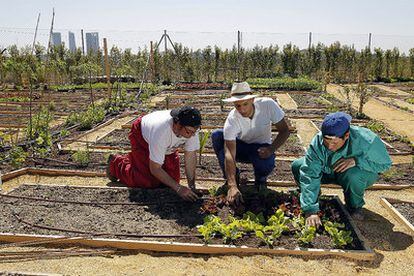When paradise is a veggie patch
Madrid allotment scheme bucks the trend in a city not known for its gardens
Nieves Gárate figured that the best gift she could give her husband, a 62-year-old mining engineer in early retirement, was a vegetable garden. For a long time he had been fantasizing about having one in Menorca, his home island. Growing his own plants sounded like a good option for his remaining years. Last Monday was his last day at work, and Nieves, who works in art management, had her surprise ready. Carlos would not have to travel or wait a few years to make his dream come true. His dream is just a 10-minute drive out of Madrid, and consists of a 20-square-meter patch of land near the paddle-tennis courts where the couple often go to play
This natural redoubt - available for rent - is located in the district of Fuencarral-Mirasierra, inside the property of the Carmen Pardo-Valcarce Foundation. The center was founded in 1948 by the current president's grandmother, as a healthy environment for the children of patients at a leprosy center in Trillo, Guadalajara. These days, the facilities include a center for people with mental disabilities, as well as a sports club.
"At Versailles I saw how disconnected we are from the old kitchen gardens"
Sandra Carretié, the mastermind behind the vegetable patch project, was always a fan of gardening. Although she took a few courses, she is basically self-taught. She had been mulling over the idea of the urban gardens for the last four years, trying to figure out how to bring the countryside to the city - or rus in urbe, the Latin motto of her Huerta de Montecarmelo project. Carretié looked at other empty plots first, but remained unconvinced. Then she saw these, and quickly presented her project to the current foundation president, Carmen Cafranga, who offered her the vacant land. To Carretié, it was like heaven on earth: in the distance, one sees the Madrid skyline of the four Castellana skyscrapers, and in the background, the mountains of Navacerrada and La Pedriza.
Carretié got to work, feeling inspired by one of her trips to France. "Standing in front of the marvelous Potager du Roi at Versailles, I reflected on how disconnected we are from kitchen gardens, the place gardens were born from and which, in the Middle Ages, symbolized paradise lost, the place where the fruit is harvested." She designed the gardens in early 2010, a task that involved cleaning the area and fertilizing.
To date, Carretié and a team of 20 workers with disabilities from the foundation have readied 80 individual patches complete with a watering system, terraces and tutors. The project took off on March 18, with half of the 80 plots already rented out and plans to extend the number to 150. Carretié explains that there is no average renter. "There are groups of four friends who share the rent, gardening fans who live in Madrid and miss the garden back in their home village, and parents who want to teach their children all about planting seeds and growing the food they will eat at home."
Everyone chooses the plant varieties they want to grow, although there is a basic structure that needs to be followed, says Pablo Prieto, one of two agricultural experts who help Carretié with her project. "The garden needs to have classic plants - tomatoes, lettuce, zucchini, leeks, onions and so on; aromatic herbs like thyme, mint, parsley or rosemary, and seasonal flowers," he explains. After that, it's up to nature to take its course.
Although this type of project is commonplace in large cities such as London, as well as parts of Italy and Germany, they are unusual in the Spanish capital. A few community gardens are run by local residents on abandoned land, while others rent out their plots. The good thing about Huerta de Montecarmelo is that if amateur gardeners lose their initial enthusiasm, the garden will still be kept going by someone else.
The evening sun is still out on Carlos' second day at his vegetable garden. Always the engineer, he produces a detailed drawing of the order in which he has placed his plants. Meanwhile, Nieves is thinking ahead to the day when the first produce will be ready. "I'm revving up the blender already."











































